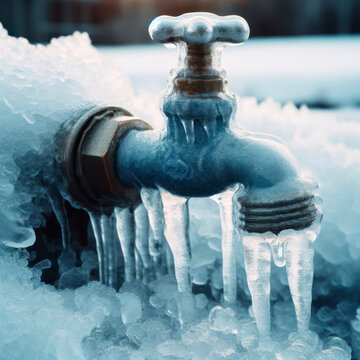Important Advice to Prevent Frozen Plumbing in Cold Weather: Expert Insights
Important Advice to Prevent Frozen Plumbing in Cold Weather: Expert Insights
Blog Article
We've uncovered this article about How to Prevent Your Pipes From Freezing directly below on the web and accepted it made perfect sense to write about it with you in this article.

Winter can damage your pipes, particularly by freezing pipes. Here's just how to stop it from happening and what to do if it does.
Intro
As temperature levels decrease, the risk of icy pipes increases, possibly leading to expensive repair services and water damages. Understanding just how to prevent icy pipes is important for house owners in cool climates.
Avoidance Tips
Protecting prone pipes
Cover pipes in insulation sleeves or utilize warmth tape to shield them from freezing temperatures. Concentrate on pipelines in unheated or outside locations of the home.
Home heating techniques
Keep interior spaces sufficiently heated up, especially areas with pipes. Open cupboard doors to permit cozy air to flow around pipes under sinks.
How to determine frozen pipelines
Try to find lowered water circulation from taps, uncommon odors or noises from pipelines, and noticeable frost on exposed pipes.
Long-Term Solutions
Structural modifications
Take into consideration rerouting pipelines far from outside walls or unheated areas. Include extra insulation to attics, cellars, and crawl spaces.
Updating insulation
Buy premium insulation for pipelines, attic rooms, and walls. Proper insulation assists keep regular temperatures and minimizes the threat of frozen pipes.
Safeguarding Exterior Plumbing
Garden hose pipes and exterior taps
Disconnect and drain pipes yard pipes prior to winter season. Install frost-proof faucets or cover exterior taps with insulated caps.
Comprehending Icy Pipelines
What creates pipes to ice up?
Pipes ice up when revealed to temperatures listed below 32 ° F (0 ° C) for extended periods. As water inside the pipes freezes, it expands, putting pressure on the pipeline wall surfaces and potentially creating them to burst.
Threats and problems
Frozen pipes can lead to supply of water interruptions, residential or commercial property damages, and pricey fixings. Ruptured pipelines can flooding homes and trigger considerable structural damages.
Signs of Frozen Water Lines
Identifying frozen pipelines early can avoid them from bursting.
What to Do If Your Pipelines Freeze
Immediate actions to take
If you presume icy pipes, keep taps available to eliminate pressure as the ice thaws. Utilize a hairdryer or towels taken in warm water to thaw pipelines gradually.
Final thought
Stopping icy pipelines calls for aggressive measures and fast actions. By comprehending the reasons, indicators, and preventive measures, home owners can safeguard their pipes throughout cold weather.
Helpful Tips to Prevent Frozen Pipes this Winter
UNDERSTANDING THE BASICS: WHY PIPES FREEZE AND WHY IT’S A PROBLEM
Water freezing inside pipes is common during the winter months, but understanding why pipes freeze, and the potential problems it can cause is crucial in preventing such incidents. This section will delve into the basics of why pipes freeze and the associated problems that may arise.
THE SCIENCE BEHIND FROZEN PIPES
When water reaches freezing temperatures, it undergoes a physical transformation and solidifies into ice. This expansion of water as it freezes is the primary reason pipes can burst. As the water inside the pipe freezes, it expands, creating immense pressure on the walls. If the pressure becomes too great, the pipe can crack or rupture, leading to leaks and water damage.
FACTORS THAT CONTRIBUTE TO PIPE FREEZING
Low Temperatures: Extremely cold weather, especially below freezing, increases the risk of pipes freezing. Uninsulated or Poorly Insulated Pipes: Pipes located in unheated areas, such as basements, crawl spaces, or attics, are more prone to freezing. Insufficient insulation or lack of insulation altogether exacerbates the problem. Exterior Wall Exposure: Pipes running along exterior walls are susceptible to freezing as they encounter colder temperatures outside. Lack of Heating or Temperature Regulation: Inadequate heating or inconsistent temperature control in your home can contribute to frozen pipes. PROBLEMS CAUSED BY FROZEN PIPES
- Pipe Bursting: As mentioned earlier, the expansion of water as it freezes can cause pipes to burst, resulting in significant water damage.
- Water Damage: When pipes burst, it can lead to flooding and water damage to your property, including walls, ceilings, flooring, and personal belongings.
- Structural Damage: Prolonged exposure to water from burst pipes can compromise the structural integrity of your home, leading to costly repairs.
- Mold and Mildew Growth: Excess moisture from water damage can create a favorable environment for mold and mildew growth, posing health risks to occupants.
- Disrupted Water Supply: Frozen pipes can also result in a complete or partial loss of water supply until the issue is resolved.
WHY CERTAIN PIPES ARE MORE PRONE TO FREEZING
- Location: Pipes located in unheated or poorly insulated areas, such as basements, crawl spaces, attics, or exterior walls, are at higher risk of freezing.
- Exterior Pipes: Outdoor pipes, such as those used for irrigation or exposed plumbing, are particularly vulnerable to freezing as they are directly exposed to the elements.
- Supply Lines: Pipes that carry water from the main water supply into your home, including the main water line, are critical to protect as freezing in these lines can affect your entire plumbing system.
- Underground Pipes: Pipes buried underground, such as those connected to sprinkler systems or outdoor faucets, can be susceptible to freezing if not properly insulated.
https://busybusy.com/blog/helpful-tips-to-prevent-frozen-pipes-this-winter/

We were shown that write-up about Prevent Frozen Pipes from an associate on another domain. You should take the time to promote this content if you liked it. I recognize the value of reading our article about Prevent Frozen Pipes .
Free Estimate Report this page